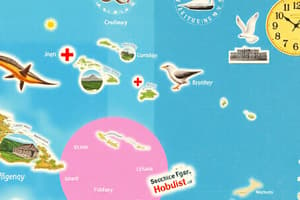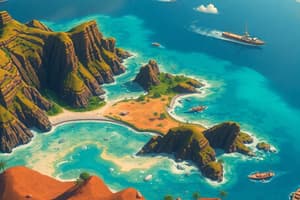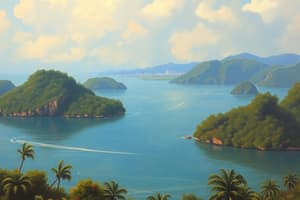Podcast
Questions and Answers
What are the two main methods used to locate the Caribbean?
What are the two main methods used to locate the Caribbean?
- Longitude and altitude
- GPS coordinates and compass direction
- Cardinal points and absolute location (correct)
- Latitude and longitude
Which of the following islands is NOT a part of the Greater Antilles?
Which of the following islands is NOT a part of the Greater Antilles?
- Trinidad and Tobago (correct)
- Cuba
- Jamaica
- Puerto Rico
Which of the following is a Leeward Island?
Which of the following is a Leeward Island?
- Guadeloupe
- Antigua and Barbuda (correct)
- Barbados
- St. Lucia
Which of the following is NOT a mainland/continental territory of the Caribbean?
Which of the following is NOT a mainland/continental territory of the Caribbean?
Which of the following is a way to define the Caribbean?
Which of the following is a way to define the Caribbean?
The Caribbean is located entirely on a single tectonic plate.
The Caribbean is located entirely on a single tectonic plate.
The Caribbean Diaspora refers to people who have migrated from the Caribbean to other parts of the world.
The Caribbean Diaspora refers to people who have migrated from the Caribbean to other parts of the world.
Which of the following countries does NOT have a communist system of government?
Which of the following countries does NOT have a communist system of government?
Which of the following is NOT a weakness of the Geographical definition of the Caribbean?
Which of the following is NOT a weakness of the Geographical definition of the Caribbean?
What is the name of the tectonic plate that the Caribbean is situated upon?
What is the name of the tectonic plate that the Caribbean is situated upon?
What are the two main factors that led to the formation of the Caribbean islands?
What are the two main factors that led to the formation of the Caribbean islands?
Flashcards
Caribbean Location (Compass)
Caribbean Location (Compass)
Locating the Caribbean using cardinal directions (north, south, east, west).
Caribbean Location (Coordinates)
Caribbean Location (Coordinates)
Using latitude and longitude to pinpoint the Caribbean's exact position on Earth.
Greater Antilles
Greater Antilles
A sub-region of the Caribbean, including Cuba, Hispaniola (Haiti/Dominican Republic), Jamaica, and Puerto Rico.
Lesser Antilles
Lesser Antilles
Signup and view all the flashcards
Windward Islands
Windward Islands
Signup and view all the flashcards
Leeward Islands
Leeward Islands
Signup and view all the flashcards
Netherland Antilles
Netherland Antilles
Signup and view all the flashcards
Mainland Territories
Mainland Territories
Signup and view all the flashcards
Caribbean Archipelagos
Caribbean Archipelagos
Signup and view all the flashcards
Caribbean Physical Features
Caribbean Physical Features
Signup and view all the flashcards
Geographical Caribbean
Geographical Caribbean
Signup and view all the flashcards
Caribbean Basin
Caribbean Basin
Signup and view all the flashcards
Geographical Weakness
Geographical Weakness
Signup and view all the flashcards
Historical Caribbean
Historical Caribbean
Signup and view all the flashcards
Historical Weakness
Historical Weakness
Signup and view all the flashcards
Geological Caribbean
Geological Caribbean
Signup and view all the flashcards
Geological Weakness
Geological Weakness
Signup and view all the flashcards
Political Caribbean
Political Caribbean
Signup and view all the flashcards
Political Weakness
Political Weakness
Signup and view all the flashcards
Caribbean Diaspora
Caribbean Diaspora
Signup and view all the flashcards
Diasporic Weakness
Diasporic Weakness
Signup and view all the flashcards
Study Notes
Caribbean Location and Definition
- The Caribbean is a diverse area comprising islands, mainland territories, and archipelagos.
- Location is described using compass directions (cardinal points) and absolute location (latitude and longitude).
- Caribbean coordinates: 21.4691° N latitude, 78.6569° W longitude.
Sub-Regions
- Greater Antilles: Cuba, Hispaniola (Haiti and Dominican Republic), Jamaica, and Puerto Rico.
- Lesser Antilles: Divided into Windward, Leeward, and Netherlands (or Dutch) Antilles.
- Windward Islands: Grenada, St. Vincent, St. Lucia, Guadeloupe, Dominica, Martinique, Trinidad and Tobago, Barbados.
- Leeward Islands: Antigua and Barbuda, St. Kitts-Nevis, Montserrat, Anguilla, Virgin Islands, St. Martin, St. Maarten, St. Barthelemy, St. Eustatius, and Saba.
- Netherlands/Dutch Antilles: Aruba, Bonaire, Curaçao.
Mainland Territories
- Guyana, Suriname, Belize, and French Guiana.
Defining the Caribbean
- There are four main ways to define the Caribbean: geographically, historically, geologically, and politically.
Geographical Definition
- The physical features of the Caribbean include mountains, valleys, plains, rivers, etc.
- The Greater Antilles islands (except Cuba) are mostly mountainous.
- Cuba has wide elevated plains and low-lying alluvial plains; it also has limestone hills with caves.
- Smaller volcanic islands in the Eastern Caribbean are rugged and mountainous.
Geographical Definition - Weaknesses
- The geographical definition includes countries not normally associated with the Caribbean, like Panama, Colombia, and others in Central America.
- It excludes the Bahamas, Turks and Caicos Islands.
- It includes territories of Suriname, Guyana, and French Guiana, which are not typically considered part of the Caribbean.
Historical Definition
- This definition focuses on the area colonized and significantly impacted by European powers (Spain, Britain, France, and the Netherlands).
- It involves elements of colonialism, including the enslavement of Africans, indentureship of people from other parts of the world, and the plantation system.
- Caribbean countries often have strong ties to the specific European power that dominated them.
Historical Definition - Weaknesses
- This definition is broad and includes countries in Central/South America that aren't typically considered part of the Caribbean.
- It sometimes ignores commonalities of experience under different colonial powers.
Geological Definition
- The Caribbean is part of a larger geological feature, the Caribbean Plate, which shares its boundaries with other plates.
- The Caribbean Plate is one of the many plates that make up Earth's crust; it is located between the North and South American Plates and the Cocos Plate.
- The presence of the Caribbean Plate means the region shares similar geological processes, such as tectonic movements, seismic activity, and volcanic processes.
Geological Definition - Weaknesses
- The definition includes countries such as Honduras, Costa Rica, Nicaragua, and Panama, which are not typically considered part of the Caribbean.
- It excludes territories like Cuba, Guyana, Suriname, the Bahamas, and Turks and Caicos Islands.
Political Definition
- The Caribbean is defined by its political entities and processes encompassing independent states, associated states, and colonial dependencies.
- Independent states are countries that govern themselves.
- Associated states enjoy rights and privileges of the country governing them, but aren't fully independent
- Colonial dependencies aren't independent and are directly governed by another country.
Political Definition - Weaknesses
- Political definition of the Caribbean sometimes includes territories outside the Caribbean region, such as areas of Central America
- Definitions that emphasize the political ties to Europe and the historical colonial powers sometimes overlook different experiences within the Caribbean.
Diasporic Definition
- Caribbean diaspora refers to people who have migrated from Caribbean regions.
- This definition highlights the complex cultural background and mixing of ethnic groups in the Caribbean.
- People originating from diverse ethnic backgrounds migrated to different parts of the world.
- The definition also highlights Caribbean identity in a global context.
Studying That Suits You
Use AI to generate personalized quizzes and flashcards to suit your learning preferences.




